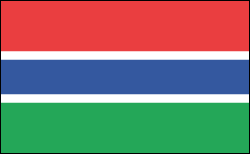Gambia | Facts & Information

- Gambia Profile
- History
Facts & Figures
-
President: Yahya Jammeh (1994)
Land area: 3,861 sq mi (10,000 sq km); total area: 4,363 sq mi (11,300 sq km)
Population (2014 est.): 1,925,527 (growth rate: 2.23%); birth rate 31.75/1000; infant mortality rate: 65.74/1000; life expectancy: 64.36
Capital (2014 est.): Banjul, 489,000
Monetary unit: Dalasi
Languages: English (official), Mandinka, Wolof, Fula, other indigenous vernaculars
Ethnicity/race: African 99% (Mandinka 42%, Fula 18%, Wolof 16%, Jola 10%, Serahuli 9%, other 4%), non-African 1%
Religions: Islam 90%, Christian 8%, indigenous 2%
National Holiday: Independence Day, February 18
Literacy rate: 52% (2012 est.)
Economic summary: GDP/PPP $3.362 billion (2014 est.); per capita: $1,700 (2014 est.). Real growth rate: 7.4%. Inflation: 5.6%. Unemployment: n.a. Arable land: 43.48%. Agriculture: rice, millet, sorghum, peanuts, corn, sesame, cassava (tapioca), palm kernels; cattle, sheep, goats. Labor force: 777,100 (2007) agriculture 75%, industry, commerce, and services 19%, government 6%. Industries: processing peanuts, fish, and hides; tourism, beverages, agricultural machinery assembly, woodworking, metalworking, clothing. Natural resources: fish, titanium (rutile and ilmenite), tin, zircon, silica sand, clay, petroleum. Exports: $107.4 million (2014 est.): peanut products, fish, cotton lint, palm kernels, reexports. Imports: $353.1 million (2014 est.): foodstuffs, manufactures, fuel, machinery and transport equipment. Major trading partners: India, China, Senegal, Brazil, (2013).
Member of Commonwealth of Nations
Communications: Telephones: main lines in use: 64,200 (2012); mobile cellular: 1.526 million (2012). Broadcast media: state-owned, single-channel TV service; state-owned radio station and 4 privately-owned radio stations; transmissions of multiple international broadcasters are available, some via shortwave radio; foreign cable and satellite TV subscription services are obtainable in some parts of the country (2007). Internet hosts: 656 (2012). Internet users: 130,100 (2009).
Transportation: Railways: 0 km. Highways: total: 3,742 km; paved: 723 km; unpaved: 3,019 km (2004). Waterways: 390 km (on River Gambia; small ocean-going vessels can reach 190 km) (2010). Ports and harbors: Banjul. Airports: 1 (2013).
International disputes: attempts to stem refugees, cross-border raids, arms smuggling, and other illegal activities by separatists from southern Senegal's Casamance region as well as from conflicts in other west African states.









